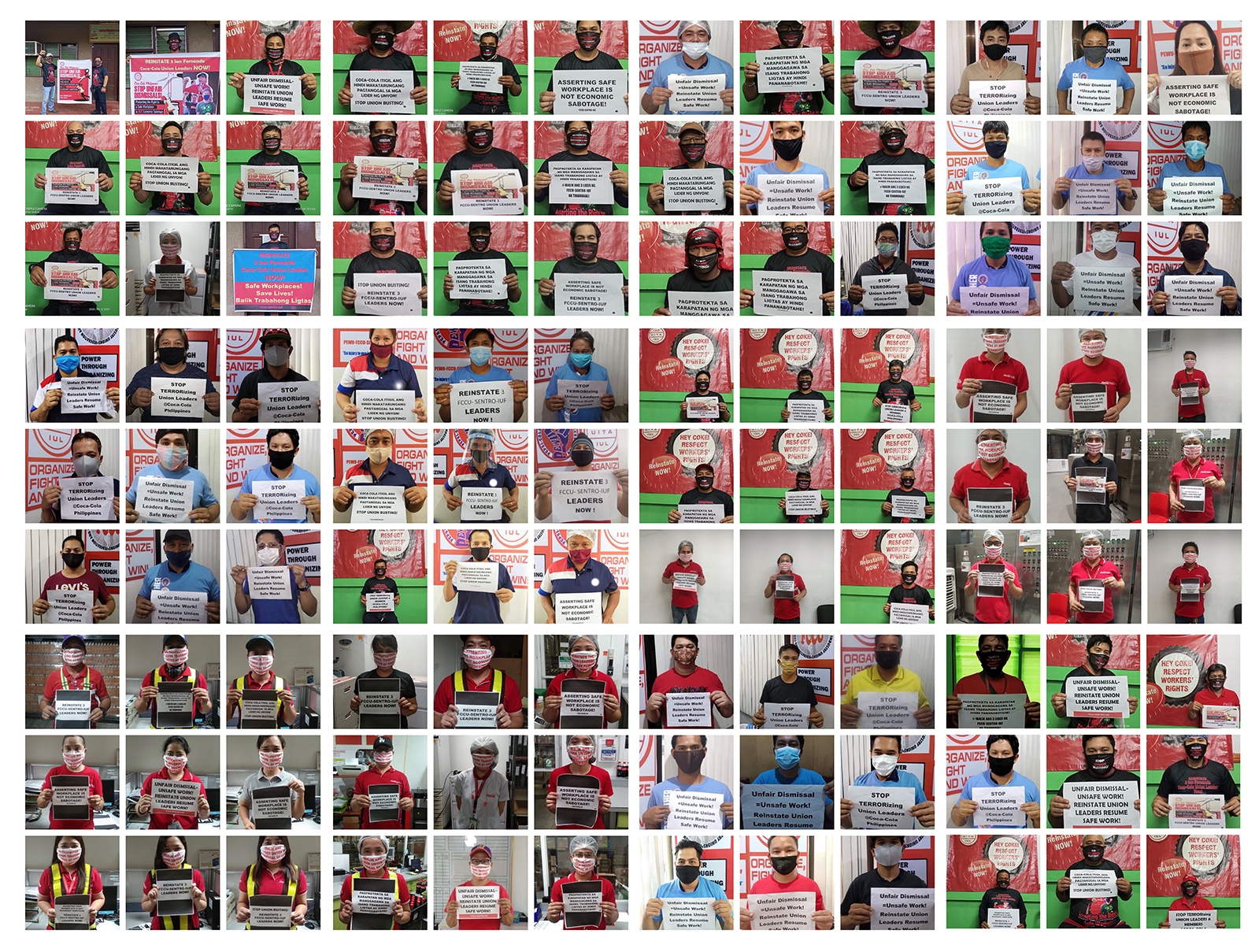
Coca-Cola Philippines union leaders defending their members' right to safe work sacked for 'economic sabotage'!
Coca-Cola management in the Philippines is capitalizing on the coronavirus emergency to attack union leaders of the IUF-affiliated FCCU-SENTRO and intimidate their members with dismissals, disciplinary procedures and the use of police power.
Federal and provincial authorities declared imposed strict lockdown measures on March 16-17, requiring people to stay at home with exceptions for the food and other 'essential' industries. Coca-Cola workers suspected of COVID-19 exposure were required by management to self-quarantine without pay. The company, meanwhile, created a media buzz by announcing a USD 3 million contribution to fighting the virus.
Workers at the Coca-Cola plant in San Fernando, Pampanga province, deeply concerned over the risk of infection following the death of a plant workers' close relative to whom he had been exposed, held an emergency union meeting on March 28. Union officers at the meeting informed the members that the union would respect individual members' decision to continue working or to stay at home if they feared exposure or contaminating others, in line with the government's recommendations. They also reported on the current state of negotiations on union demands to management concerning hazard pay, compensation for employees unable to report for work due to the lockdown, transport and related issues arising from the public emergency. Following the meeting, the union president Alfredo Marañon who is also FCCU National President took special precautions to ensure the continuity of production in the event of staffing shortages, as the plant was already operating with a reduced crew.
Rather than responding to the union's demands, management retaliated on April 6-8 by disciplining 7 union officers and members at the San Fernando and Canlubang plants, including Alfredo Marañon, Belarmino Tulabut, and Danilo Pineda, charging them with "economic sabotage". The three leaders were terminated on May 8.
Management retaliation escalated after FCCU National General Secretary Brendo Enriquez wrote to Coke management on May 18 protesting the dismissals and sharing the communication with his members and with the IUF. Enriquez has been disciplined for 'besmirching' the company's reputation and other supposed violations of Coke's disciplinary code and faces termination.
On June 9, 20 union members at San Fernando were arrested for taking part in a peaceful picket in front of the plant protesting the termination of their elected leaders. The protesting workers wore masks, maintained physical distancing and had agreed on procedures with the local police. Despite this they were arrested. They were released after several hours with charges dropped following the intervention of Alfredo Marañon, who defended the action as taking place in the context of an ongoing labour dispute.
The Philippines' Department of Labor and Employment is paralyzed due to the pandemic emergency; the normal appeals process to contest unfair dismissal is in practice not available. Coke is capitalizing on the pandemic to attack fundamental union rights.
Coke operations in the Philippines are wholly owned by The Coca-Cola Company in Atlanta, USA, and managed through their Bottling Investments Group (BIG). Responsibility for intimidation, dismissals and threats to our affiliate and its members lies squarely with The Coca-Cola Company.
CLICK HERE to sign our petition to the Coca-Cola Company, calling on it to stop abusing the national health emergency to attack and restrict trade union rights and ensure that the rights of FCCU-SENTRO and its members are fully respected throughout its operations in the Philippines. Management must act immediately to reinstate all dismissed union leaders, drop the absurd charges against Brendo Enriquez, engage in good faith with FCCU-SENTRO on COVID-19 protocols, and fully respect the union's right to freedom of assembly and to communicate with its members and with the IUF on these issues.

 Facebook
Facebook Google+
Google+ Reddit
Reddit Twitter
Twitter






